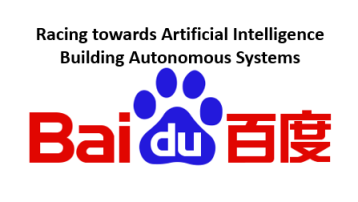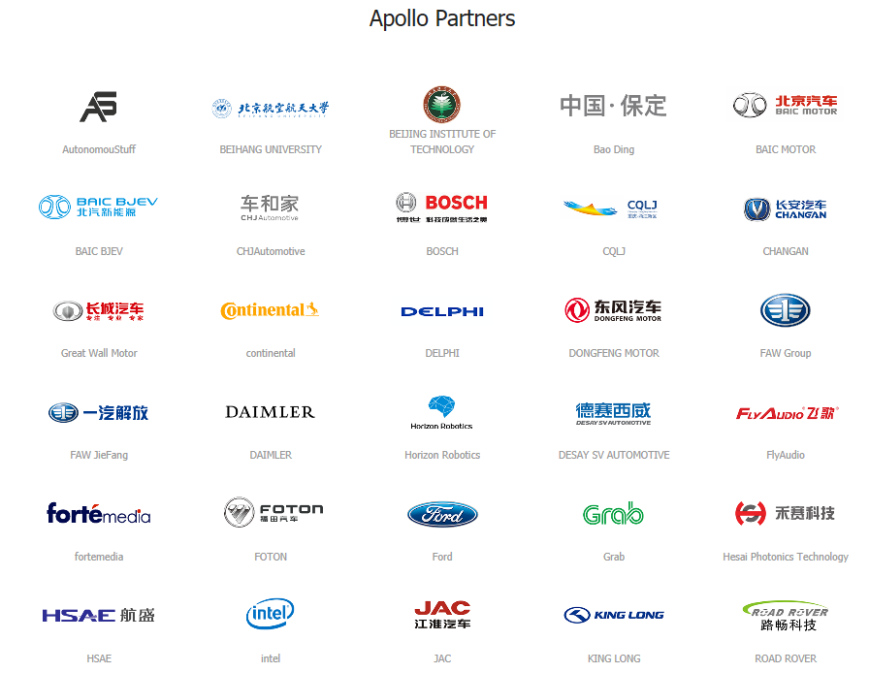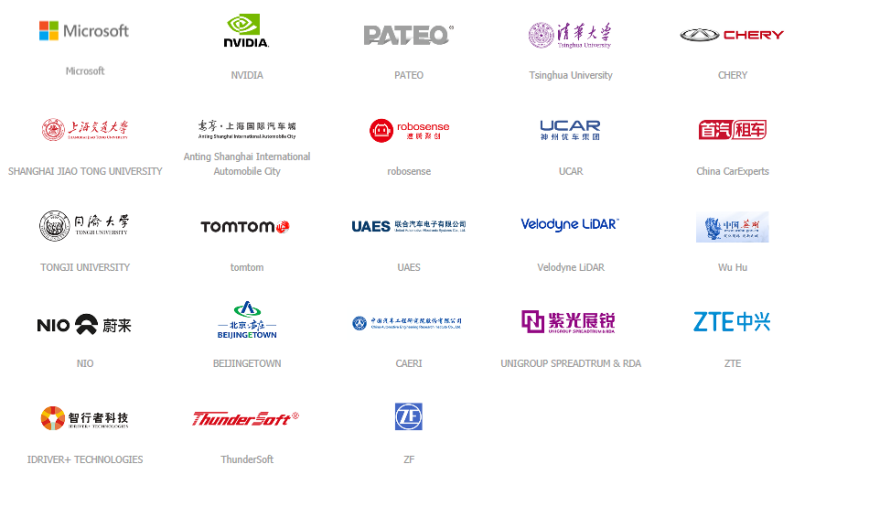In the latest update to its platform, Baidu says partners can access new obstacle perception technology and high-definition maps, among other features.  We are told that the company with the most data will win. To get the real edge it is to have and train algorithms that interpret the intelligence and here you need to understand the value of AI (Artificial Intelligence).
We are told that the company with the most data will win. To get the real edge it is to have and train algorithms that interpret the intelligence and here you need to understand the value of AI (Artificial Intelligence).
Now there is a significant “buzz” on AI at present but where it is really taking off is in China and one company needs to be followed is Baidu.
How Baidu is going about this is to build ecosystems that commercialize AI technology and then attract this ecosystem of partners and developers to accelerate AI into actionable knowledge.
Then we see the Autonomous Platform emerging……
Just released a further update
Chinese search engine giant Baidu is to spend 10bn yuan (£1.1bn; $1.5bn) on new driverless car projects over the next three years. The “Apollo Fund” will invest in 100 autonomous driving projects over the next three years, Baidu said in a statement.. The move is an attempt to catch up with US rivals by enlisting outside help.It now has 70 partners across several fields in the auto industry, up from 50 in July, it says
The launch of Baidu’s “Apollo Fund” coincides with the release of Apollo 1.5, the latest version of its open-source autonomous vehicle software. In the latest update to its platform, Baidu says partners can access new obstacle perception technology and high-definition maps, among other features”.
The Power of Multiple Ecosystems of AI technology
They have what they have called the Baidu Brain that offers more than 60 different types of AI services in their suite that becomes the meeting place for those external developers, customers and partners to learn, gather and share so they can extract the extended learning for all the participants within the ecosystem.
Baidu matches, perhaps even betters Siri and Cortana, as it has accumulated more conversational-based skills than anyone else- remember that most data wins. Their emerging partner system is lagging behind Amazons who have developed these into those skill sets as the ecosystem for this is larger at present in the United States but Baidu are intent on catching up and leveraging this in their own unique ways.
They are using their DuerOS platform in leveraging the smart home market.
They work with over 100 brands of private home appliances including refrigerators, air conditioners, TV’s, speakers etc. So they are in competition on voice technology. Baidu argues they might have a real edge as the home in China is smaller it offers a more attractive end-result through voice interactions and having better acoustic environments. So the majority of homes in China, India, Japan, in Asia and Latin America are more aligned to what they are learning in China than the larger home environment in North America. Now how long this is an edge depends as Alexa,
Now how long this is an edge depends as Alexa, Echo and Cortana are certainly focusing hard on the home and mobile total voice recognition market. Still we need to constantly look East far more today than in the past to recognize the emerging competition that are global forces to be reckoned with..
The Self-driving initiative called Apollo is what really caught my attention
What raised my attention, besides all of the above going on at Baidu, is their recent highly ambitious self-driving initiative called Apollo, launched only a few months ago. They have attracted in over 50 partnerships and those are becoming a “Who’s Who” of the auto business and service providers. The company has also been working on a self-driving car in its Silicon Valley lab that’s ramping up even more.
A clear quote from a recent interview in a www.wired.com story with the COO, Qi Lu, who was Microsoft’s Satya Nadella’s leading deputy until he left and joined Baidu was really interesting. Some of his remarks I find illuminating:
“ If you want to truly build digital intelligence to be able to acquire knowledge, make decisions, and adapt to the environment, you need to build autonomous systems. In autonomous systems, the car is the first major commercial application that is going to land”
“It’s just like the phone ecosystem today. The phone ecosystem is the largest silicon software ecosystem. I believe the same thing will happen for the autonomous system. The car is going to build a larger ecosystem. And the same set of capabilities—hardware, sensors, chip sets, software—will be used to build industry robots, home robots”
“We want to have hundreds of companies and universities all at work on this, building a very large ecosystem. Then we can build robots, build drones, and build all those autonomous systems. So, to me, autonomy is a key”
Autonomy is the key and the Car is the Application that is going to land………
Essentially, from where things are today, toward the future of being able to be fully autonomous, the fundamental technological path for the self-driving technology is the speed of iterations”- Qi Lu.
So where does that speed come from? Actually less from the (speed of the) car but from the data you can get to make autonomous realizable and to do this you need this ecosystem of collaborators to learn, exchange and evolve their understanding of all this means.
The aim of Apollo is to pull together all of those resources to make this happen on the Baidu platform. To outline their proposition to attract others into the Ecosystem was providing a clear manifesto of Apollo, a governance charter built on four overarching principles
ROAD MAP for Autonomous Cars within the Baidu Platform and Ecosystem

The ‘ambition’ in the dates comes from where the ‘rubber is hitting the road’ most likely In China or Singapore, the regulatory environment is very different from the US, they might or can be a faster ‘test bed’ for full Autonomous Driving and is partly why so many Global Partners have joined (see below for visual of partners)
The Apollo Manifesto Promise comes through a clear Governance
Firstly their Apollo Manifesto Promise is worth a read but for me, here, yet I wanted to focus on their Apollo Governance (reproduced here as a great example of an Ecosystem Governance Model)
The Principles are based upon: Open Capability–Shared Resources–Accelerated Innovation–Sustained Mutual Benefit
From their web site:
“Apollo is an open platform whose primary purpose is to become a vibrant autonomous driving ecosystem by providing a comprehensive, safe, secure, and reliable solution that supports all major features and functions of an autonomous vehicle”
Apollo’s ambition is no less than to revolutionize the auto and transportation industries, and there will be challenges of unprecedented scale and complexity along the way. Given Apollo’s enormous potential to change the world, this historic opportunity requires a unique governance model that must support a highly effective leadership which is as inclusive and open as possible in order to swiftly achieve Apollo’s vision.
In order to safeguard the architectural integrity, system reliability, and rapid evolution of Apollo, Baidu is willing to step up and exercise its leadership in driving important decisions whenever needed while preserving active participation of the wider community.
The Apollo manifesto: Open Capability–Shared Resources–Accelerated Innovation–Sustained Mutual Benefit.
In essence, Apollo is the freedom from wasting time and resources re-implementing fundamental components and allows each member of the ecosystem to focus on their specific areas of expertise, which will dramatically increase the speed of innovation.
Apollo’s comprehensive, modular solution allows anyone to use as much or as little of the existing source code and data. Open source code portions can be modified and open capability components accessible through an API can be replaced with proprietary implementations. All this can then be contributed back to Apollo, redistributed, and commercialized.
Critical considerations such as ensuring reliability, handling failover, and guaranteeing security that would pose a challenge to most development efforts will be readily available components. Everyone can benefit from Apollo’s capabilities to improve individual competitive advantage.
Apollo provides high-quality code and data that allows anyone to bootstrap their autonomous driving development, but only with contributions from Apollo’s partners and the wider community can Apollo become increasingly more capable. The goal is to create a virtuous cycle where software and services are deployed in the vehicle to obtain quality data, which is then used to create an even more capable autonomous system. Accelerating this iterative cycle is the engine of innovation that will give birth to a viable autonomous vehicle and compelling services leading to a breakthrough autonomous ecosystem.
Apollo welcomes anyone to make technical and non-technical contributions, but the most valuable contribution is high-quality data, it is the very fuel that drives innovation. Baidu will seed Apollo with its vast data set that the community can experiment with. However, Baidu’s contribution alone is not enough to sustain Apollo’s evolution let alone realize Apollo’s grand ambition. Therefore, Apollo will create an innovative data collective that will pool high-quality data from Apollo’s partners, each of whom can leverage a larger data set than it can gather individually.
This innovative platform and data service create a lasting, mutually beneficial business model that accelerates individual innovation as well as sustains the growth of a breakthrough ecosystem. On a broader level, Apollo will engage academia, government, and the general public in order to convince and educate society on the acceptance and adoption of autonomous technology.
Only by growing the ecosystem together rather than through individual efforts can the full potential of autonomous vehicles and services be realized for the benefit of all.
The Power of their Platform within the Ecosystem
So Baidu is opening up their capability in code, in services, in data to all partners. In a highly fragmented market like China, this gives scope, scale, and speed of understanding. There are over 250 OEM’s in China alone. The data sets are in some cases offered with no strings attached but each partner has to contribute their data. They are applying the concept of “the more you contribute, the more you should be able to get back”
They are providing simulation engines so innovation should accelerate and as Baidu is focusing on its area of expertise, delivering high-end and value services, HD maps and security as outlined in their manifesto.
So far they have attracted some of the Worlds best within the Ecosystem.


With the potential within all these partners within the Ecosystem and working through the Baidu Apollo platform, it does hold the real potential of accelerating autonomous vehicles better than efforts so far in the West.
Summary
We know the autonomous car will take a long time, longer than most are predicting I would suspect. Yet Baidu is determined to find the ways to enable full autonomy. They believe there is so much commercialization ahead of full autonomy and they believe their data understanding can be a leading-edge provider, through this Apollo initiative.
It leaves me to wonder if this level of collaboration potential is at all possible in the West, as home markets are so mistakenly protected and jealously guarded, so collaboration has many hidden barriers that delay advancement and believe it delays the risk of disruption. I would suggest you use your home market to radically evolve, If the Western organizations continue to constrain themselves to making real, radical change when technology suggests it is feasible, it becomes a losing position. Does this form of collaborative offering by Baidu hand a real competitive edge to China in such an evolution towards Autonomous Vehicles?
Of course, politics can get in the way but the momentum and connected sharing of the partners concerned do make this more complicated to separate the global economy. Let’s clearly see how this evolves but this does seem to offer a leading edge for the Autonomous Vehicle that might make it through some rough patches ahead, as it is centered around such an exciting platform of Intelligence and Data flow to advance the vehicles design and ability to perform as envisaged.
It needs following as it develops as it really does seem Apollo is a platform to watch and how the collaboration within the Ecosystem thrives, with East meeting West.